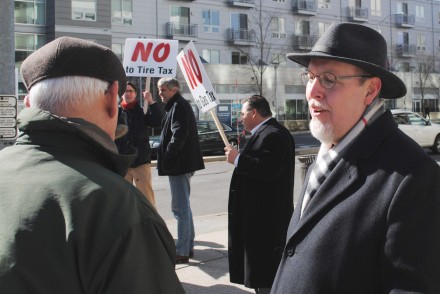
The state is broke and needs new revenue sources. Supporters of tolls say it’s one solution. State Senator Joe Markley, a Republican candidate for lieutenant governor, writes in this commentary that implementing tolls is “just one more tax, another way for the state to pick our pocket.”
“It’s not what you don’t know that gets you in trouble” Mark Twain is reputed to have said. “It’s what you know for damn sure that’s wrong.”
Connecticut residents who call for tolls on our highways will pay dearly for their ignorance if what they want becomes law.
The most common fallacy is the notion that tolls can be installed solely at or near our borders. The federal government simply won’t let us do that. Not only will they take away hundreds of millions each year in funding they’ve given us since we took the tolls down; they’d have the right to demand repayment of the funds we’ve received for these thirty toll-free years. Border tolls are an impossibility that leads astray the uninformed.
Equally futile is the hope that the tolls will only affect one region of the state. The Connecticut Department of Transportation has made clear that their plans include tolls not only on all three interstates, but on all limited-access highways (not just I-95, 84 and 91, but Routes 2, 8, 9, 15, 72, 691 and the rest) with overhead gantries to charge us electronically every five miles or so (Governor Malloy had the gall to demand a toll every mile on certain stretches of I-95).
Some think Connecticut residents can be exempted from paying. Massachusetts (for example) gives its residents a break: twenty percent off on the Turnpike, which still leaves a hefty charge. More in-state favoritism than that and again the feds would step in, claiming interference with interstate commerce, the clause that has long been used to control the states.
The fact is, aiming tolls only at out-of-staters simply wouldn’t provide enough revenue to make them worthwhile. The DOT said in their 2015 report that no more than a quarter of the traffic on our interstates comes from out-of-state. To collect the billions a year Malloy wants, Connecticut residents would have to pay serious money.
How much might that be? The 2015 Department of Transportation (DOT) study models two charges: ten and twenty cents a mile. Even the lower rate is two and a half times the national average; at twenty cents a mile, we’d pay five times the Massachusetts fee. A commuter with a twenty mile trip each way to work (the distance from my hometown of Southington to Hartford) would pay nearly $2,000 in tolls in the course of the year.
The fee would be much greater if we adopt congestion pricing, a scheme much favored by unelected transportation bureaucrats, which imposes higher rates when traffic is heaviest. That means commuters who must be on the road at rush hour will bear the burden, not interstate truckers or travelers who can choose their time to pass through our state.
If the tolls come back, the DOT has made clear they will be expensive, and they will be everywhere. They will be a tax, like any other tax, and we will be the ones paying it. And the money will go where the legislature sends it–no guarantee can ever be made that toll receipts will only be used for transportation costs. Anyone who believes that has much more faith in the legislature than legislators have in themselves.
The constitutional lockbox–which will be on the ballot this November–is an attempt to reassure citizens that money collected for transportation purposes will be spent on them. But the Democrats who back the amendment admit themselves that it’s flawed: there’s no requirement that funds collected through tolls or the gas tax be placed in the lockbox in the first place. The security of the lockbox hardly matters if no money is deposited in it.
The state already collects enough to keep our transportation system in shape. Misplaced priorities have been the problem, not inadequate revenue. Rather than spending billions on unnecessary new projects like the New Britain to Hartford Busway to Nowhere (at a cost of nearly $1,000 per inch, and a yearly subsidy of $20 million) or the high speed rail line to Springfield, we should have taken care of the infrastructure we already have.
Tolls are just one more tax, another way for the state to pick our pocket. Whatever politicians might say, and whatever you might believe, Connecticut residents will pay the lion’s share of any toll system likely to be adopted. Ask not for whom the state tolls, for that we know: if it tolls, it will toll for us.


If the suburban legislators would stop appropriating funds to build schools and soccer fields in Simsbury, Avon and Farmington Malloy wouldn’t be threatening highway tolls.
Connecticut nothing but taxes
Markley is full of shit. If we would lose Federal highway funds because of tolls then tell me if New York or New Jersey are getting any funds. According to this guy we are the only state getting Federal Funds because we are the only state on the east coast with No tolls. Senator you politicians have been trying to sell that bullshit for years